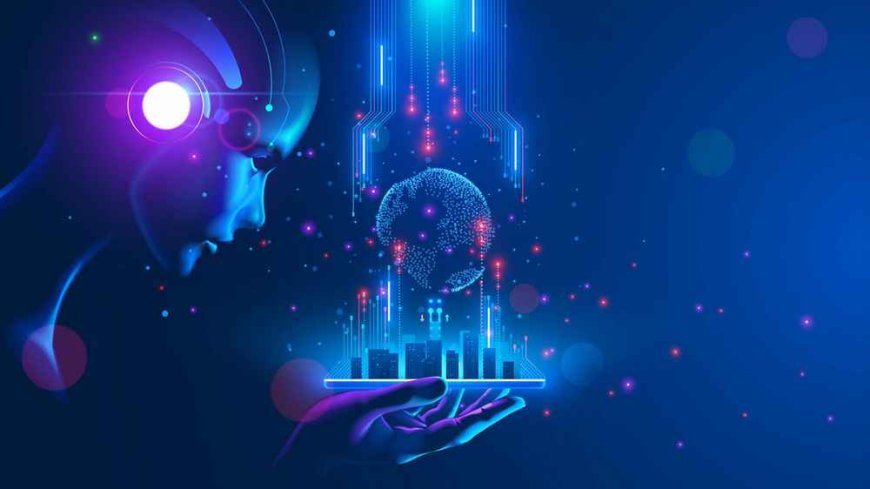The Future of AI: Unlocking Boundless Possibilities in the Coming Year
Artificial Intelligence (AI) continues to evolve and shape our world, revolutionizing industries, enhancing productivity, and transforming

Artificial Intelligence (AI) continues to evolve and shape our world, revolutionizing industries, enhancing productivity, and transforming the way we live. As we embark on a new year, the future of AI holds immense promise, with groundbreaking advancements on the horizon. This article delves into the transformative potential of AI in the coming year, exploring key areas such as automation, healthcare, personalized experiences, ethics, and the collaborative role of humans and machines.
Automation: Redefining Efficiency and Productivity.
In the coming year, AI will accelerate the automation revolution, reshaping industries and redefining efficiency. Intelligent machines will increasingly handle repetitive tasks, freeing up human workers to focus on more creative and complex endeavors. With advancements in natural language processing, computer vision, and robotic automation, industries such as manufacturing, logistics, and customer service will witness increased productivity, reduced costs, and enhanced operational efficiency.
Healthcare: Revolutionizing Patient Care and Medical Research.
AI is poised to revolutionize healthcare by transforming patient care and medical research. In the coming year, we can expect AI-powered systems to play a vital role in early disease detection, personalized treatment plans, and improved patient outcomes. Machine learning algorithms will analyze vast amounts of medical data, enabling accurate diagnosis, drug discovery, and predictive analytics. AI-powered chatbots and virtual assistants will enhance patient engagement and provide real-time support, while robotics will assist in surgeries and rehabilitation processes.
Personalized Experiences: Tailoring Solutions to Individual Needs.
The future of AI lies in its ability to deliver personalized experiences across various domains. In the coming year, AI will refine its understanding of user preferences, enabling personalized recommendations, content curation, and adaptive user interfaces. Virtual assistants will become more intuitive, understanding context and providing tailored assistance. AI-powered marketing and customer service platforms will deliver hyper-personalized interactions, enhancing customer satisfaction and loyalty.
Ethics: Nurturing Responsible AI Development.
As AI advances, ethical considerations become increasingly important. In the coming year there will be an increased focus on developing transparent, fair and accountable AI systems. Efforts will be made to mitigate bias in algorithms, address privacy concerns, and establish ethical guidelines for AI development and deployment. Collaboration between policymakers, industry leaders, and researchers will be crucial to ensure responsible AI innovation that benefits society as a whole.
Human-Machine Collaboration: Unleashing Synergy.
In the future of AI, collaboration between humans and machines will be paramount. The coming year will see an emphasis on augmenting human capabilities through AI technologies. Humans will provide context, creativity, and emotional intelligence, while machines will offer computational power, data analysis, and automation. This synergy will unlock new opportunities in fields like scientific research, design, and problem-solving, leading to breakthroughs that were previously unimaginable.
Smart Cities: Enhancing Urban Living.
In the coming year, AI will play a pivotal role in transforming cities into smart, sustainable environments. AI-powered systems will optimize energy usage, monitor infrastructure, and manage traffic flow to reduce congestion and improve safety. Sensor networks and predictive analytics will enable early detection of environmental hazards, ensuring quick responses to natural disasters. Moreover, AI will enhance citizen engagement through intelligent chatbots, personalized services, and data-driven decision-making, making cities more livable and efficient.
Education: Personalized Learning and Skill Development.
AI will revolutionize education by enabling personalized learning experiences and skill development. In the coming year, adaptive learning platforms powered by AI algorithms will assess students' individual strengths and weaknesses, tailoring educational content and pacing to their needs. Virtual tutors and intelligent tutoring systems will provide personalized guidance, fostering better learning outcomes. AI will also support educators in automating administrative tasks, freeing up their time for student engagement and innovative teaching methods.
Cybersecurity: Battling Evolving Threats.
As technology advances, so do cybersecurity threats. In the coming year, AI will become a critical component in fortifying cybersecurity defenses. AI-powered systems will leverage machine learning algorithms to detect and respond to cyber threats in real-time. They will analyze vast amounts of data, identify patterns, and detect anomalies that human analysts might miss. AI-driven cybersecurity will proactively anticipate evolving attack vectors, strengthen network security, and protect sensitive data, providing a robust defense against emerging cyber threats.
Sustainability: Promoting Environmental Conservation.
AI will contribute significantly to addressing environmental challenges and promoting sustainability. In the coming year, AI algorithms will help optimize energy consumption in buildings, predict climate patterns, and improve resource management. Machine learning models will support precision agriculture, reducing water usage and increasing crop yields. AI-powered systems will aid in wildlife conservation efforts, monitoring endangered species and combating illegal wildlife trade. By harnessing AI's analytical capabilities, we can make significant strides toward a greener and more sustainable future.
Ethical AI Governance: Establishing Frameworks and Regulations.
As AI continues to advance, it becomes imperative to establish robust ethical frameworks and regulations. In the coming year, there will be a growing focus on AI governance, ensuring that its development and deployment align with ethical standards. Policymakers and industry leaders will collaborate to establish guidelines for transparency, fairness, and accountability in AI systems. Furthermore, there will be increased efforts to address concerns surrounding data privacy, algorithmic bias, and the social impact of AI, fostering a responsible and inclusive AI ecosystem.
As we look to the future, the potential of AI is vast and transformative. From smart cities and personalized education to cybersecurity and sustainability, AI's impact will continue to expand across various domains. However, it is essential to navigate this future with caution, ensuring that ethical considerations, responsible governance, and human collaboration remain at the forefront. By doing so, we can harness the full potential of AI and create a future that is both technologically advanced and human-centric.
